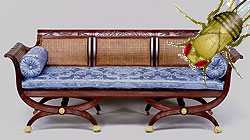The Last Moment of a Fly

Take a neat, clean, and ordered house. Hire a group of cleaning specialists to work on it, and have it so perfectly clean that no speck of dust can be seen whatsoever. Hire a group of decoration professionals, and have it so perfectly ordered that you cannot change the place of any object without violating the perfect geometry of the whole. Now, look for a person whose only job will be to keep the perfection of the house. Martha would be my choice for that job. She was married to a young professor friend of mine, Charles Thinkmore. Charles liked to speak scientific lingo, and I must confess with shame that I used to be that way, too. On the other side, his good taste for beers was remarkable.
One hot day, I was giving a ride to my friend, Joe, a professor of biology, and we decided to pay a visit to Charles Thinkmore.
"Hi Charles! Remember Joe Heart? He is now the head of the biology department," I said.
While the others were introducing and shaking hands, I went straight to the refrigerator for my beer. Martha smiled at me, but her body language reproved my actions; I knew it.
When I sat on the sofa with my beer, I saw that Martha had set Charles apart from us. She was vehemently saying something. I didn't understand it, and I didn't care.
Then Charles came to us and said, "Here is the problem. There is a fly in the house, and in Martha's opinion, I have to look for a swatter and kill that fly."
Just then, I saw a fly flying in perfect circles around the most ordered and neat living room I had ever seen in my life.
Trying to avert the fly, Charles continued: "I have a different approach to the problem. It is crucial that we consider the life expectancy of the fly which is about four weeks. Given the fact that the age of the fly in the house is unknown, it is most likely this fly would die in just a few days. Further, the life expectancy of a human being is almost five thousands weeks now. In consequence, my conclusion is that it will be more efficient to wait."
I saw Martha. Her face was red; she was furious. I thought Charles was kidding, so I added some economic jargon to the conversation. "I think, Charles, that you have to add the cost benefit dimension to this problem. It all depends on the value of your time looking for the swatter, as opposed to the alternative use of your time."
"Wait a minute!" intervened Joe very loudly. "We need more specific data about this particular fly!"
Only then I realized that my friends were serious. I thought, "This can't be real!"
Martha's face, so formal and respectful, now was red in an effort for not yelling, "lazy!"
I don't know if the fly understood that Charles's argument was in its favor, but it started flying closer to Charles. To me, the fly considered several times to land on Charles's head, but it kept flying.
Meanwhile, Charles and Joe were following the fly flight around the room, trying to estimate its age.
Then, I turned my attention from the fly to Martha. She was on her knees trying to fish the swatter out of the closet. I thought, "This can't go on; it just can't."
Martha had finally found the swatter, and I stopped drinking my beer. With a somber face, she was walking toward the fly.
My friends were now discussing probability theory, both trying to speak at the same time.
"Joe, listen to me," said Charles. "The probability of the fly dying at any moment is far greater than zero. This fly can perish even right now!"
The fly finally decided to land on Charles's forehead. Instinctively, as he was pronouncing those words, with his palms upwards, he hit the fly. His face contracted in a sign of disgust.
Charles said, "Gentlemen, I think I killed our subject."
Then Martha relaxed, put the swatter behind her back and said, "Charles, wash your hands!" and trying to look compassionate, "Poor fly!"